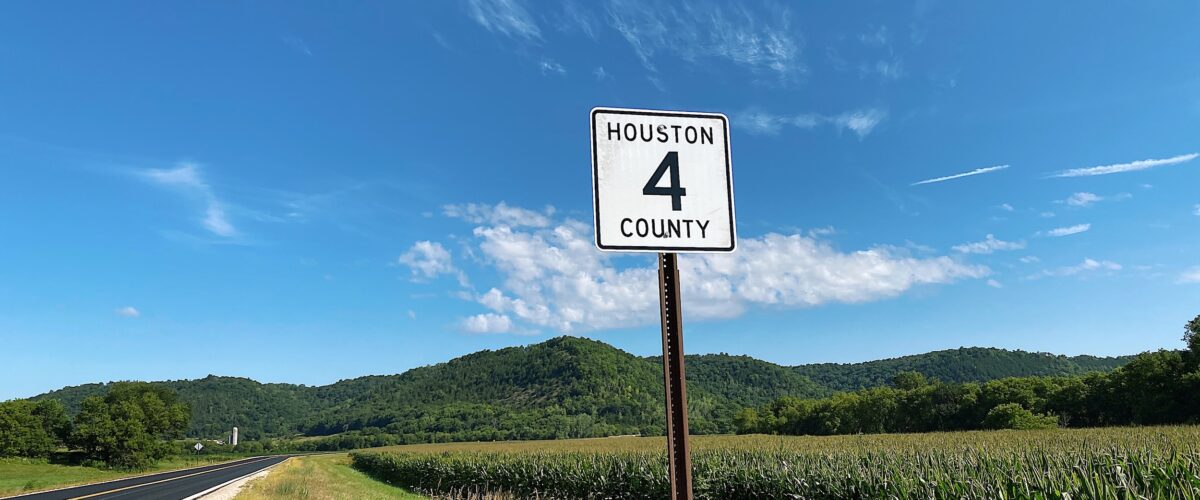This piece on COVID-19 and food production is part of a larger project to document the culinary resilience of southeastern Minnesota’s Houston County during the pandemic. You can read more about my Crystal Creek Citizen-Artist Residency project here.
The pandemic has been tough on farmers. As one Houston County resident says, “Farmers are resilient and adaptable. They’re getting creative. You try to see the silver lining, but the truth is, it’s been very hard.”
Some producers are launching websites or direct marketing initiatives to survive COVID-19. But while tech-savvy farmers are able to adapt, others can’t pivot so easily because they don’t have the right tools. One local producer describes that some older farmers struggle to get by with just Facebook and word of mouth. It’s been a challenge.
Jordan and Rachelle Meyer of Wholesome Family Farms in Caledonia are direct marketing experts. On a visit to their farm in late August, I ask if they are seeing a shift due to COVID-19. “We’ve had a huge response,” Rachelle reports. “Suddenly, people are worried about not finding meat,” she explains. She believes COVID-19 is making people think twice about the quality of their food. It’s also helping them realize the benefits of a shorter supply chain. “Food is better that way. Your meat hasn’t been sitting on a shelf,” Rachelle adds.
Wholesome Family Farms raises 100% grass-fed beef and goats. They also sell pasture-raised chickens, pigs, turkeys, and free-range eggs, all direct to consumers through their website where customers can purchase a quarter or half of beef as well as individual pork cuts like ham, bacon, and pork chops.
“E-commerce is so important now,” Rachelle stresses. “If more farmers could market directly to consumers, it would be much better for our communities. By buying pork, eggs, and beef locally, you’re helping support a small family versus helping some CEO of a huge company buy a mansion,” Jordan says. “And farmers are able to sell their products for what they should be getting,” he adds.
Rachelle Meyer of Wholesome Family Farms and Dayna Burtness of Nettle Valley Farm recently shared their direct marketing experience through a webinar presented by the Sustainable Farming Association. The webinar explored consumer relationships, direct marketing, and becoming price makers rather than price takers.

Pigs at Nettle Valley Farm
Wholesome Family Farms prioritizes transparency. “It’s important to show the ups and downs of farming. Relationships are huge,” Rachelle tells me. “Customers want to know their farmer. They want to know where their food comes from and how it’s raised,” she adds.
Some people may be intimidated by the idea of buying half a cow or a whole hog, so Wholesome Family Farms educates consumers on their blog. They share favorite recipes and provide guides to cooking through a half hog. They also advise customers about required freezer space. Freezers are in high demand as more people buy directly from farmers.
With butcher shops overwhelmed and processing plants unstable due to COVID-19, many producers have been scrambling. More people are butchering at home. Some are selling their animals at deep discounts to consumers planning to butcher on their own. I talk with a local farmer who reports, “I know people who butchered like 15 animals between two families over a couple days. Luckily, they knew how to do it. The agriculture world is crazy right now.”
COVID-19 has created demand for some businesses and been a struggle for others. For butchers, it’s been almost crippling demand. “If you know anyone that wants to start a butcher shop, now is the time to do it!” Jordan says enthusiastically. “Most butchers will be booked up for quite some time,” he adds.

Bluff Country Meats, Eitzen
Jordan and Rachelle farm regeneratively, a practice that focuses on soil health and increased biodiversity. “Our neighbors often say, ‘What are the Meyers up to now?’” Jordan laughs. But the Meyers are changing a few minds. They share the story of an 82-year-old bachelor farmer who initially resisted the idea of frequently moving cattle for grazing until he saw the results. Now he tells Jordan, “You gotta get those cows moved!”
The two transitioned to regenerative farming a few years ago after attending a soil health summit in North Dakota with Gabe Brown. “We try to work with nature, not against it,” Jordan explains. “Better soil health is better for ecosystems and healthier for animals. It’s all about mimicking nature,” Jordan adds.
Rachelle and Jordan want to raise their five young children on a farm that takes care of nature. Wholesome Family Farms is non-GMO and everything is pasture-raised. They don’t use antibiotics or hormones. They don’t deworm or spray their cows. “We basically run organically without the certification because we want to stay affordable for families,” Rachelle describes.
Three years ago, the Meyers switched to no-till gardening. They haven’t watered at all this year, even though it’s been quite dry. And they don’t pull weeds—they just mow between the rows. Seedlings get planted directly into the grass. At the end of the year, everything gets stomped down to let things seed themselves. Rachelle says tomatoes came up from last year and pumpkins and gourds are growing where they weren’t before. “Whatever grows just grows,” she shrugs.
As I leave, I tell them they’re doing inspiring work at the farm and through their website.
“It’s a never ending world of learning,” Jordan replies.

Elisabeth A. Fondell is a writer, potter, and food enthusiast living in the rural Midwest. She is currently working on Food Stories From Houston County, a project documenting stories of culinary resilience in Minnesota’s southeastern-most county through the Crystal Creek Citizen-Artist Residency.
Elisabeth began focusing on place-based food writing after receiving a grant from the Southwest Minnesota Arts Council to create a body of work celebrating the intersection of food and culture. See that exhibit here.










